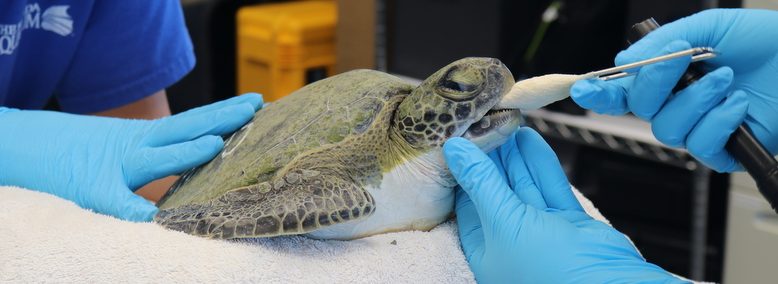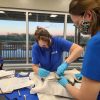The animal care team of The Florida Aquarium’s Sea Turtle Conservation Program is hard at work caring for six new endangered green sea turtles. Rescued by the Florida Fish and Wildlife Conservation Commission on the east coast of the state, this group of turtles will receive ongoing and specialized care with the ultimate goal of releasing them back into the open ocean.
On the heels of a historic stranding event in Texas, The Florida Aquarium recently admitted six green sea turtles to its Sea Turtle Rehabilitation Center at the Center for Conservation (CFC) in Apollo Beach, where they are also caring for three endangered Kemp’s ridley sea turtles. While an event of that magnitude in Texas is rare, the stranding of sea turtles is an all-too-common occurrence. The state of Florida experiences hundreds of strandings each year as a result of cold-stunning, habitat loss, entanglement, pollution, boat strikes, and more.
“These turtles are all experiencing the effects of being cold-stunned,” said Dr. Lindsey Waxman, Senior Veterinarian for The Florida Aquarium.
Cold-stunning occurs when cold-blooded animals, like sea turtles, are exposed to unusually cold water and/or air temperatures for an extended period of time; causing a hypothermic reaction that may include a lower heart rate, decreased circulation, lethargy, and if not cared for, death.
“They become debilitated,” added Waxman, “and often develop secondary medical conditions like skin infections, pneumonia, and other bacterial infections.”
The turtles in the Aquarium’s care are experiencing a variety of medical issues and at varying degrees. Three of the turtles are in critical condition. Despite life-saving measures, another turtle from this admission, the seventh, succumbed to complications of its condition.
“It’s incredibly unfortunate whenever we lose an animal, both from the individual’s standpoint,” said Dr. Debi Luke, Senior Vice President of Conservation. “but also from a conservation perspective because all species of sea turtles are considered endangered under the Endangered Species Act and every animal is critical to species survival.”
Transferred from The Marine Science Center (MSC) in Ponce Inlet and the Whitney Marine Lab at the University of Florida, St. Augustine, a treatment regimen is underway led by Waxman and Ashley Riese, Manager, Sea Turtle Rehabilitation Center.
Care for these turtles includes conducting consistent bloodwork and other diagnostic tests such as x-rays and monitoring of respirations and heart-rates, providing daily medical treatments such as administration of IV fluids, antibiotics, and other medications, wound care, conducting swim tests, and feeding.
“It’s a labor of love for us here at the Sea Turtle Rehabilitation Center,” said Riese, who with along with the team are working countless hours to tend to the six green sea turtles. “We will take whatever measures necessary to rehabilitate these animals to see them released.”
“Sea turtle populations are being negatively impacted by many human-related factors, added Luke. “So it’s important that the public also do their part in protecting sea turtles by helping to mitigate these threats. Consider limiting consumption of single-use plastic products and be mindful of how you discard plastics and fishing line.”
“Even small changes in behavior can have a big impact,” added Riese.
All sea turtle rehabilitation work conducted by The Florida Aquarium is done with the approval of the U.S. Fish and Wildlife Service and the Florida Fish and Wildlife Conservation Commission (FWC) under conditions not harmful to marine turtles and authorized under conservation activities pursuant to FWC MTP-19-179.
For more news on The Florida Aquarium in Tampa and theme parks, attractions, and more across the region, be sure to follow Touring Central Florida on Twitter @androckb & @TourCentralFL, and like our Facebook page.





